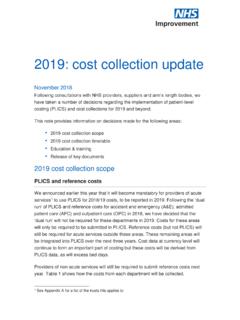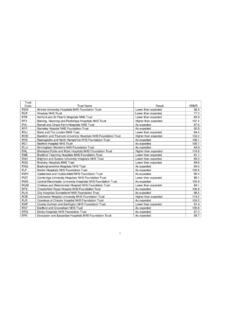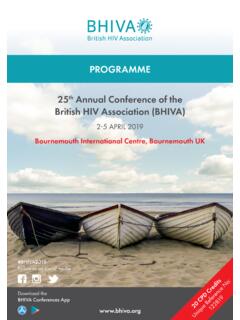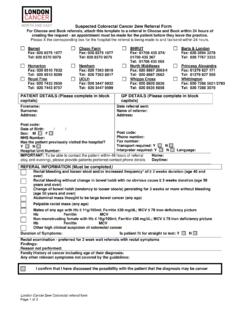Transcription of June 2018 - health.gov.ie
1 Adult type 1 diabetes mellitus National Clinical Guideline No. 17. June 2018. National Patient Safety Office Oifig N isi nta um Sh bh ilteacht Othar This National Clinical Guideline for adults with type 1 diabetes has been developed by the Guideline Development Group, supported by the HSE National Clinical Programme for Diabetes. Part of the process of developing this guideline involved contextualising (for Ireland) the National Institute for Health and Care Excellence (NICE) NG17 Type 1 diabetes in adults: diagnosis and management guideline, published in 2015. Using this National Clinical Guideline This National Clinical Guideline applies to adults (aged 18 years and older) with type 1 diabetes in Ireland.
2 It does not apply to children living with type 1 diabetes, adults living with type 2 diabetes or individuals living with monogenic (or other rarer forms of) diabetes. This National Clinical Guideline is relevant to all healthcare professionals working in healthcare settings delivering care to people living with type 1 diabetes. Readers should note that sections of the guideline relating to the National Institute for Health and Care Excellence (NICE) contextualisation are denoted by a blue background and border. Disclaimer NCEC National Clinical Guideline do not replace professional judgment on particular cases, whereby the clinician or health professional decides that individual guideline recommendations are not appropriate in the circumstances presented by an individual patient, or whereby an individual patient declines a recommendation as a course of action in their care or treatment plan.
3 In these circumstances the decision not to follow a recommendation should be appropriately recorded in the patient's healthcare record. Users of NCEC National Clinical Guideline must ensure they have the current version (hardcopy or softcopy) by checking the relevant section in the National Patient Safety Office on the Department of Health website: Published by: The Department of Health Hawkins House, Hawkins Street, Dublin 2, D02 VW90, Ireland Tel: +353 (1) 6354000. ISSN 2009-6259. Department of Health, June, 2018. This guideline draws on NICE guidance NICE (2015) Type 1 diabetes in adults: diagnosis and management. Available from All rights reserved. Subject to Notice of rights. NICE guidance is prepared for the National Health Service in England.
4 It is subject to regular review and updating and may be withdrawn. NICE accepts no responsibility for the use of its content in this publication. Citation text Department of Health (2018) Adult type 1 diabetes mellitus (NCEC National Clinical Guideline No. 17). Available at: | A National Clinical Guideline | Adult type 1 diabetes mellitus 1. Membership of the Guideline Development Group (GDG). The GDG was chaired by Dr Kevin Moore, Consultant Endocrinologist. This National Clinical Guideline is supported by the HSE National Clinical Programme (NCP) for Diabetes. Membership nominations were sought from a variety of clinical and non-clinical backgrounds so as to be representative of people living with type 1 diabetes and all key stakeholders involved in the care of people living with type 1 diabetes.
5 Members of this group are listed in table 1. Membership was sought from primary care and feedback was requested during consultation after a substantive draft was completed. All sections relating to diabetic retinopathy were contextualised by Mr David Keegan, clinical lead of the National Diabetic Retinal Screening Programme. Refer to appendix 1 terms of reference for the GDG. Membership of the NICE Guideline Development Groups are listed in tables 2, 3 and 4. The Health Research Board Collaboration in Ireland for Clinical Effectiveness Reviews (HRB-CICER) team is listed in Annex 1. Table 1: Members of the Guideline Development Group Name Job title and affiliation Dr Kevin Moore (Chair) Consultant Endocrinologist Prof Sean Dinneen Clinical lead NCP Diabetes/Consultant Endocrinologist Niamh Smyth NCP-Diabetes Programme Manager Tony McPoland Patient Representative Shane O'Donnell Patient Representative Anna Clarke Health Promotion and Research Manager Diabetes Ireland Dr Ronan Canavan Consultant Endocrinologist Dr Diarmuid Smith Consultant Endocrinologist Dr Mensud Hatunic Consultant Endocrinologist Dr Colin Davenport Consultant Endocrinologist (Specalist Registrar Endocrinologist at start of development process).
6 Margaret Humphreys Clinical Specialist Diabetes Dietitian /National HSE Structured Patient Education Co-ordinator Cathy Breen Senior Dietitian Diabetes Mary Finn Senior Dietitian Diabetes Karen Townsend Clinical Nurse Specialist Diabetes Pauline O'Hanlon Clinical Nurse Specialist Diabetes Mary O'Scannail Clinical Nurse Specialist Diabetes Helen Twamley Clinical Nurse Specialist Diabetes Integrated Care Prof Brian McGuire Professor of Clinical Psychology Eilis Kearney Clinical Pharmacist 2 | Adult type 1 diabetes mellitus | A National Clinical Guideline Membership of the NICE Guideline Development Groups Table 2: Members of NICE Guideline Contextualisation Quality Assurance Team Name Job title and affiliation Christine Carson Programme Director Phil Alderson Clinical Advisor Rachel O'Mahony Technical Advisor Andrew Gyton Programme Manager The Guideline Development Group members listed in table 3 are those for the 2015 update.
7 For the composition of the previous Guideline Development Group, see the full guideline ( ). Table 3: Members of the NICE Guideline Development Group Name Job title and affiliation Stephanie Amiel Professor of Diabetic Medicine, King's College London Augustin Brooks Consultant Diabetologist, Bournemouth Hospital Arthur Durrant Patient member Michael Flynn Consultant Physician, Kent and Canterbury Hospital Roger Gadsby Visiting Professor, Institute of Diabetes in Older People, University of Bedfordshire; GP; and Principle Teaching Fellow, University of Warwick Peter Hammond Consultant Physician, Harrogate District Hospital Michael Kendall Patient member Vibhuti Mistry Lead Diabetes and Obesity Dietitian, Homerton University NHS Foundation Trust Henrietta Mulnier Lecturer in Diabetes Nursing, King's College London Victoria Ruszala Specialist Pharmacist, Diabetes and Endocrinology, North Bristol NHS Trust Stuart Smellie Consultant in Chemical Pathology, Durham and Darlington NHS Foundation Trust Perdy van den Berg Clinical Lead.
8 Oxfordshire Diabetes Service Jill Cobb Information Scientist Dalia Dawoud Health Economist Bernard Higgins Clinical Director Elisabetta Fenu Health Economics Lead Bethany King Document Editor/Process Assistant Rachel O'Mahony Senior Research Fellow Nancy Pursey Senior Project Manager | A National Clinical Guideline | Adult type 1 diabetes mellitus 3. Table 4: Members of the NICE Project Team Name Job title and affiliation Christine Carson Guideline Lead Phil Alderson Clinical Adviser Clifford Middleton Guideline Commissioning Manager Jennifer Wells Guideline Coordinator Nichole Taske Technical Lead Bhash Naidoo Health Economist Lyn Knott Editor Credits The role of the NCEC is to prioritise, quality assure and recommend clinical guideline to the Chief Medical Officer for endorsement by the Minister for Health.
9 It is intended through Ministerial endorsement that full implementation of guidelines will occur through the relevant service plans. The NCEC and the Department of Health acknowledge and recognise the Chair and members of the Guideline Development Group (GDG) for development of the guideline. The NCEC and Department of Health wish to express thanks and sincere gratitude to all persons contributing to this National Clinical Guideline; especially those that give of their time on a voluntary basis. Acknowledgments As chair of the GDG, I wish to acknowledge the support of all members of the GDG as contributors to the development of this National Clinical Guideline. In particular I wish to thank and acknowledge the contributions of Prof.
10 Sean Dinneen and Niamh Smyth. I also want to acknowledge NCEC for their support throughout the process of generating the clinical guideline. The GDG would like to thank NICE for facilitating us to contextualise their guideline. In addition, I would like to highlight the excellent and efficient work of HRB-CICER in putting together the budget impact analysis. Finally, I would like to express my thanks to those who took the time to share their expertise and provide feedback during the external consultation process. Dr Kevin Moore Chair, Guideline Development Group, February 2018. 4 | Adult type 1 diabetes mellitus | A National Clinical Guideline National Clinical Guidelines Providing standardised clinical care to patients in healthcare is challenging.






